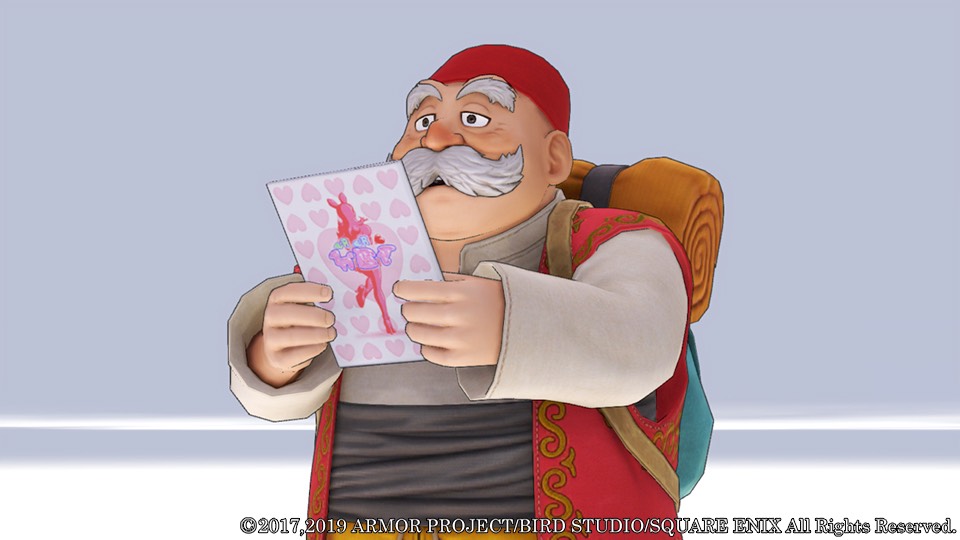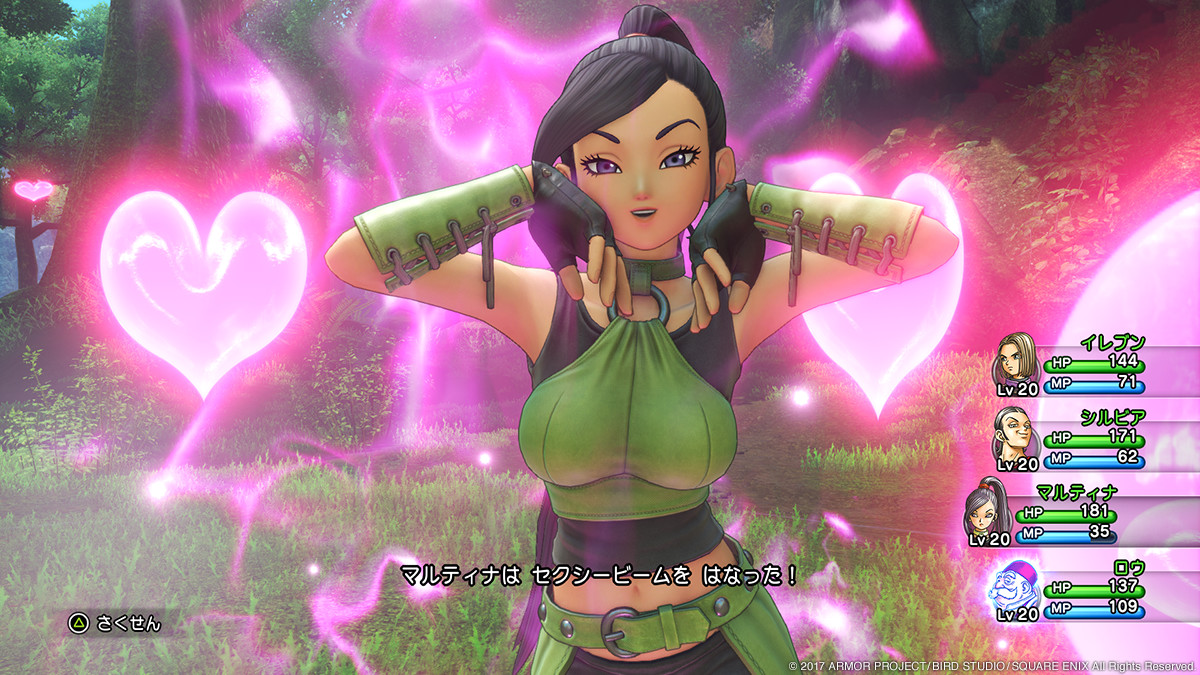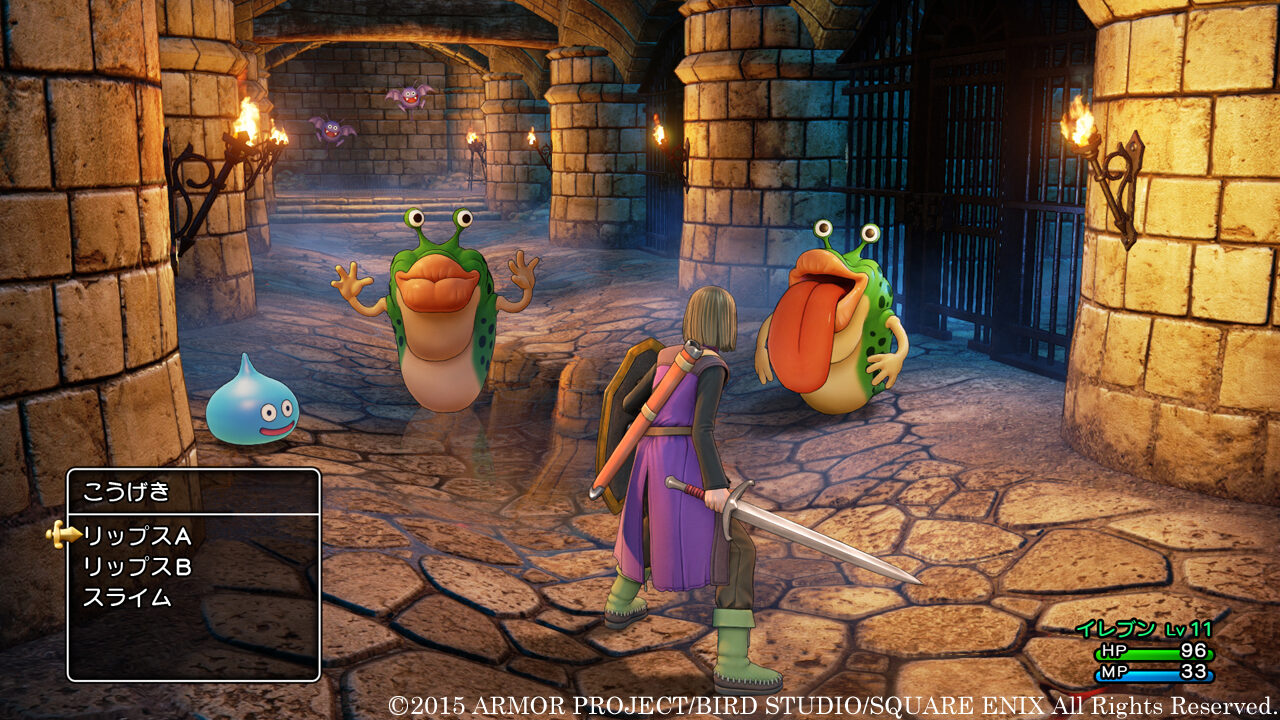“Okay, so, you have 20 health left. If that Goldman hits you for 15 damage, how much health do you have remaining?” my dad leaned in and asked five-year-old me while I played Dragon Warrior on the original Nintendo. That was how I started learning about numbers and reading. Needless to say, the series has been close to my heart for almost my entire life. I was excited when the second game came around, and then the third and fourth. And then came the drought. Nothing. I had no way of knowing that Japan had already enjoyed Dragon Quest V and VI. But then I heard about Dragon Warrior VII coming to the PlayStation. Dad! I need that! I was already a teenager by then, but I had the exuberance of a young child, as if stoking old fires that had long since died down. Fast forward to today when I’m 36, leaning in, and enjoying every second of Dragon Quest XI. This time, I’m sharing it with my daughter.
Dragon Quest XI follows the Luminary, a descendant of the first Luminary who saved the world from darkness. Our humble silent protagonist sets off to begin fulfilling his destiny after he learns of the secret, but where exactly does that road lead? This epic, 120-hour adventure took me through hills, valleys, castles, towns, over mountains, under water, through the air, and across time. Fantasy-based JRPGs have followed this formula and plotline before, but none have done so with such incredible drama, charismatic characters, or outstanding pacing.

To be honest, I’ve kind of “moved on” from JRPGs. They just don’t excite me the way they used to, barring Final Fantasy and Dragon Quest titles. I’m tired of the same structure, outlandish personalities, and benevolent protagonists. What makes DQXI different? The execution — the how. Yes, from an outsider’s perspective, this could easily be rendered down to “just another JRPG,” but the truth is that all the stories in the world have already been told. What separates one narrative from another is the how. Simply put, for those after a fantasy-based JRPG, Dragon Quest XI is the gold standard. It is king.
One problem I’ve had with more modern Dragon Quest titles like Dragon Warrior VII and Dragon Quest VIII is that the heartbreaking and joyous stories are there, but they fail in the delivery. On paper, these plotlines should cause the player to tear up and jump for joy, but only so much can be done with the hardware limitations and lack of voice acting. DQXI throws its weight behind high production values not just in magnificent voice acting and well-directed story scenes, but in the detail of the entire world.
Those instances in isolation wouldn’t be as powerful if not for the entire world of this game containing such painful attention to detail. Without convincingly vast and well-constructed landscapes, beautiful cloudy skies, and ambient sounds in each location, I honestly would be less impacted by that fisherman’s story. I’m more immersed in the world because of the quality work done here, and that means I get more out of the highs and lows.
120 hours of turn-based combat, huh? Yeah! Actually, I’m over turn-based traditional JRPG combat, too, but it’s done with such exquisite balance and tenacity that I can’t really complain — which has become a hallmark of Dragon Quest titles. Full disclosure, I played Dragon Quest XI S with harder enemies and no other Draconian Trial activated and I could not have been happier. Any easier, and I would have wept from boredom. I had to grind in a few places, but otherwise, the bountiful sidequests and opportunities for exploration forced me to “grind” for levels without it ever really feeling like grinding. Most boss battles took me multiple attempts, but each time I was satisfied with the challenge, and the game forced me to rework my strategy, pay more attention to my consumable items, and reallocate skill points.

DQXI is more than just turn-based combat, though. With a party of four, players can swap in other team members waiting in the wings so that they can use their unique strengths and skills to fit a challenging situation in combat. I had to do this for casual encounters, too, which typically only occur if the player wishes: by walking into enemies roaming the overworld or dungeons. Initially, the different characters run together a bit, but by story’s end, each characters’ arsenal was so different that I pored over each decision of who to start combat with and when to swap them out.
Each level up grants stat gains, but also a certain number of skill points that can be used on a hex-based grid to improve a character’s unique personality trait or weapon(s) of choice. Sometimes players have the opportunity to unlock super skills that are hidden behind a question mark, but only if four of the potential six skills around it are unlocked first. Sometimes these question marks are housed within a specific weapon. Other times, they share edges with various weapon types, forcing players to risk investing points in another weapon type before unlocking that skill. Is it worth it? You have to unlock to find out. Fortunately, skill points can be refunded for a fee at the church.
While the combat, skill trees, and equipment don’t revolutionize the genre or communicate significant depth, they marry exceedingly well with the demands of combat. The seamless flow between character level, skill availability, and equipment opportunities offer a spectacular feeling of balance that, again, is a hallmark of the Dragon Quest series. I can’t praise Dragon Quest XI for doing anything particularly unique or innovative, but I can absolutely state without equivocation that its gameplay is so meticulously balanced that finding fault is not only difficult, it feels wrong to try.
Of course, Dragon Quest games are known for their distractions, but typically fewer than other JRPGs. Dragon Quest XI departs from this expectation with a whole host of side quests, other worlds to explore, and, of course, casinos. In fact, just looking around the world is its own reward, and not just with regard to finding hidden crafting materials or treasure chests, but the visuals. What a world!

And that’s the key: it’s a world. I care about the people in each village and castle. Since the game goes through so many changes, I’ve come to learn about nameless NPCs and recognize them upon return trips, sometimes eagerly anticipating how their seemingly insignificant life has changed in response to current events. The developers further made me feel a part of this world by engaging in a fascinating trick of the camera wherein members of my party during particularly dramatic scenes will look straight into the camera and speak lines like, “Thank you for saving me” or “You’re the only one who can do this.” Afterward, the camera reveals that they had been speaking to the main character, but for a brief while, I felt like they were talking to me. It’s a subtle, simple trick that I may have completely fabricated in my own mind, but if intentional, kudos to the designers.
Dragon Quest is known for its stellar soundtrack, especially since Dragon Quest VIII. While DQXI’s soundtrack leans on classic tunes occasionally, the new tracks are outstanding. From the casual and boss battles to the whimsical sailing through the ocean, the oftentimes ambient tunes satisfy and create a tranquil feeling matched by the colorful palette of the world.
I typically favor games that introduce something new to the gaming landscape, because I think trudging through old waters — even incredibly — doesn’t really push us forward as a culture or in terms of design. Dragon Quest XI is just too good, though. In fact, it’s one of the best games I’ve ever played. I laughed, I cried, and I’ve felt a part of this cast. I’m actually on hour 140 with no signs of stopping, and I couldn’t be happier. Without question, this is one of the best-designed games I’ve played to date, and I’ve had the beautiful opportunity to share it with my daughter who has adorably pointed at the screen, screaming, “It’s a monster octopus!”




